With almost 460 million native speakers worldwide, Spanish is among the widely spoken languages on Earth; many people are also learning it.
It’s safe to assume you’re also on your Spanish learning journey.
Thus, one of the most practical questions to know is, how do you say Where are you from in Spanish?
This will enable you to engage in meaningful cultural interactions and initiate Spanish-speaking contacts from all around the world.
When you’re travelling abroad in Latin American cities, meeting new people in your community, or practising your language skills with your Spanish-speaking neighbour, this phrase provides an exchange that Google Translate can’t deliver in numerous social situations.
In this quick guide, we’ll break it down for you in a way that’s easy, clear, and super useful for real-life situations.
A quick hack would be to ask our AI Chat to pronounce ¿de dónde eres?, or even coach you on formal and informal Spanish phrases to make you a better conversationalist.
How To Answer “Where Are You From?” in Spanish
You don’t have to panic when someone asks you where are you from in Spanish. Rather, you should be ready and learn how to respond boldly in Spanish.
This will help you greatly whether your conversation is informal or somewhat more official, especially for your career.
First, you have to understand what you’ve been asked in Spanish.


Never Worry About AI Detecting Your Texts Again. Undetectable AI Can Help You:
- Make your AI assisted writing appear human-like.
- Bypass all major AI detection tools with just one click.
- Use AI safely and confidently in school and work.
- ¿De dónde eres? — This means Where are you from in Spanish informal.
- ¿De dónde es usted? — This means Where are you from in Spanish formal.
Not to worry, as both variations are asking you the same thing. The usage just depends on the level of politeness or the context in which you’re having the conversation.
The standard response to the question is:
- “Soy de [the place you’re from].” — “I am from [place].”
- “Soy” — I am
- “De” — from
For instance:
- “Soy de Australia.” (I am from Australia.)
- “Soy de Londres.” (I am from London.)
- “Soy de Nueva York.” (I am from New York.)
- “Soy de los Estados Unidos.” (I am from the United States.)
Alternative Responses to “Where Are You From” in Spanish
There are several ways to express where you’re from other than “Soy de.”
In case your origin is a little more complex, these other statements will enhance your explanation and provide clarity when responding to others.
- Vengo de [país/ciudad/región]: This implies “I come from…” and offers additional means of stating your origin. This expression is slightly more literal but equally correct.
- Vengo de Puerto Rico. (I come from Puerto Rico.)
- Vengo de Francia. (I come from France.)
- Nací en [lugar]: This means “I was born in…” You can use this if you want to specify your birthplace, in contrast to where you’re from generally.
- Nací en Colombia. (I was born in Colombia.)
- Nací en Argentina. (I was born in Argentina.)
- Crecí en [lugar]: This, conversely, means “I grew up in…” You use this to share more about your background.
- Crecí en Perú. (I grew up in Peru.)
- Soy originario(a) de [lugar]: This is a more formal way to say “I am originally from…” somewhere.
- Soy originaria de Chile. (I am originally from Chile.)
- Soy [nationality]: This means “I am [nationality].” With this, you can show your nationality.
- “Soy canadiense.” (I am Canadian.)
- “Soy australiano/australiana.” (I am Australian.)
- Different Birthplace and Current Residence: One way to describe yourself if you were born in one country but now reside in another is “Nací en [birthplace], pero vivo en [current place].”
- “Nací en Colombia, pero vivo en España.” (I was born in Colombia, but I live in Spain.)
Politeness When Answering “Where Are You From” in Spanish
Politeness is key in Spanish conversations. This is why you should be aware of the correct expressions to apply.
Typical expressions used in casual conversations are:
- Soy de aquí (I am from here) or Soy de allá (I am from there).
This adds a sense of belonging or distance depending on context.
Example:
- Soy de aquí, de Sevilla. (I am from here, from Seville.)
- Soy de allá, de Venezuela. (I am from there, from Venezuela.)
Tips for Politeness and Context
- Use “Soy de…” in almost all contexts. This phrase is polite enough for both formal and informal situations that you may find yourself in.
- In strict formal contexts, however, you might want to say “Mi lugar de origen es…” This means my place of origin is…
- To be grammatically correct, you have to include the preposition “de” (from) as it is essential in these expressions.
Country Names and Nationalities
Now, responding in Spanish can be challenging since the spelling and name of your country might differ.
To assist you with common countries and their equivalent nationalities in Spanish, refer to the table below.
| Country (País) | I am from… (Soy de…) | Nationality (Nacionalidad) |
| United States | Estados Unidos | estadounidense |
| England | Inglaterra | inglés (m), inglesa (f) |
| Canada | Canadá | canadiense |
| Germany | Alemania | alemán (m), alemana (f) |
| Brazil | Brasil | brasileño (m), brasileña (f) |
| Italy | Italia | italiano (m), italiana (f) |
| China | China | chino (m), china (f) |
Of course, none of this will come easily.
You might be overwhelmed by the pronunciations, mistaking the right phrase to use, or have different social settings you’re about to step into.
In such a case, you need practical help to guide you. Rather than looking for a tutor or a fluent Spanish speaker for help, you can use our AI Chat.
All you have to do is interact with the AI and describe these settings so you’ll have robust answers for real-life interactions.
- First of all, get to the AI Chat.
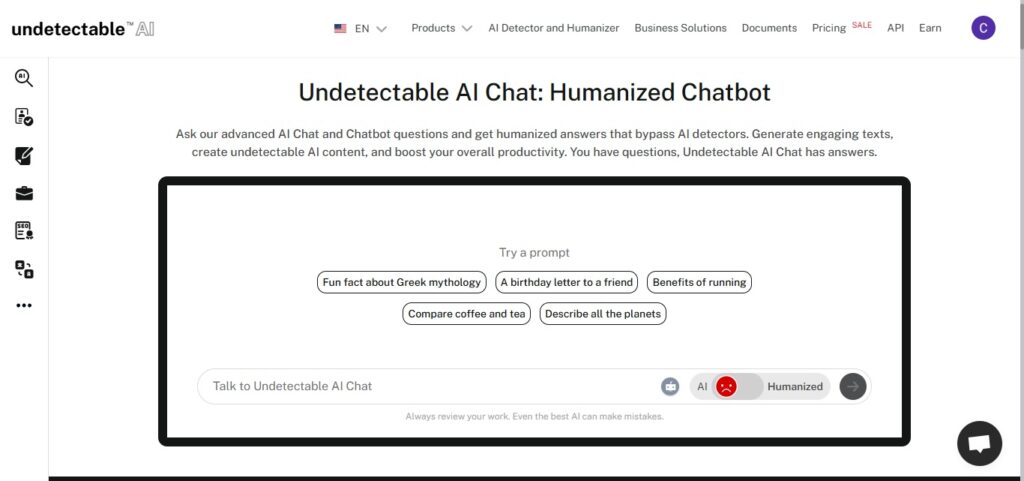
- Depending on the setting you have in mind, ask AI the question. Be as thorough and detailed as possible.
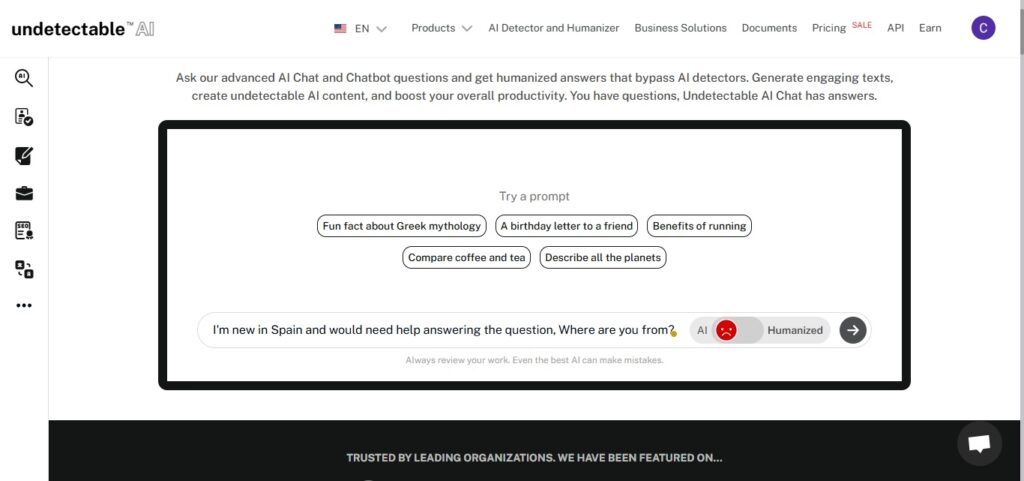
- Send the prompt and await the AI’s response.
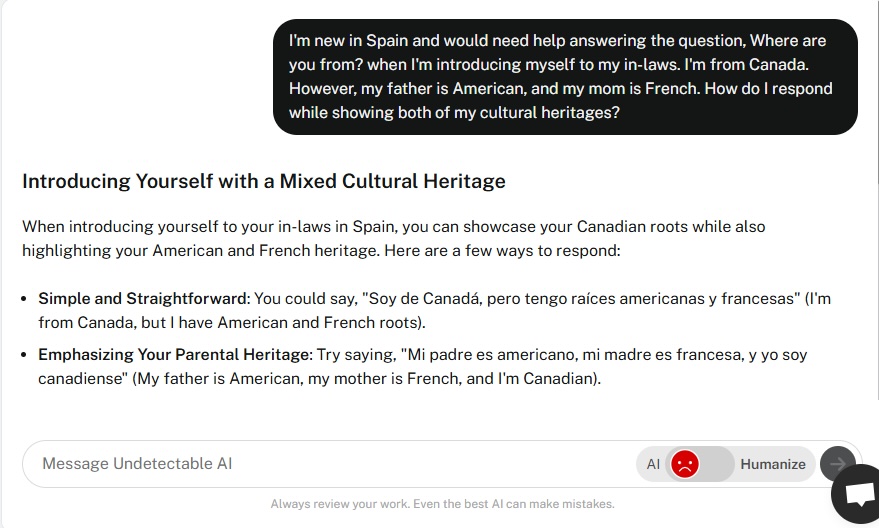
- Now, you can see the response and tweak your prompt to better capture your circumstance.
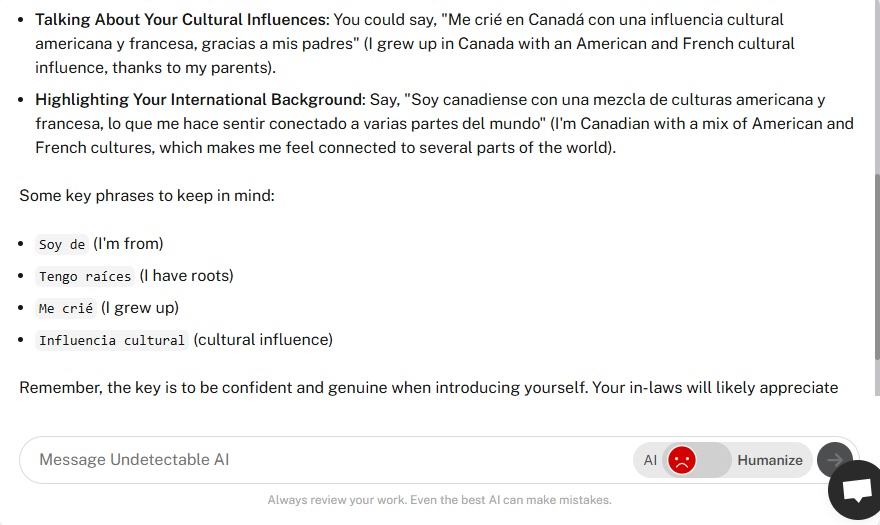
Cultural Tips When Asking About Origins
Although asking “where are you from” in Spanish can be a fantastic conversation starter, you must recognise that such a question is complex since not all Spanish speakers have the same culture.
Hence, you will get varying answers and reactions.
So, it’s best to take general cultural considerations.
- Respect Boundaries: You should be aware that some people may be sensitive about their background. This could be because of political circumstances or personal reasons. So, it’s best to be respectful when asking this question.
- Avoid Assumptions: Over 20 countries have Spanish as their official language, speaking a variation of Spanish. Therefore, don’t assume someone’s nationality based just on looks. This could give the wrong impression to your interlocutor and make the conversation tense.
- Show Genuine Interest: You have to be genuine when inquiring about someone’s background. If they believe you’re doing this for formality’s sake, they could offer dry responses.
- Reciprocal Question: Once you ask this question, just know that you’ll be asked to reciprocate.
- Formal and Informal Contexts: Also, consider your relationship with the individual before asking the question. Through this, you’ll know when to be either official or informal in your approach. Using the formal form shows respect in professional or first-time encounters.
Specific Cultural Contexts
Beyond general considerations, you should keep in mind that specific Spanish speakers would engage in this conversation differently from what you expect.
- Latin American vs. Spanish Interactions: While Spaniards may be initially more guarded, many Latin American nations have fast become friendly and thorough when discussing roots.
- Indigenous Sensitivities: Mixed countries have a fraught history with indigenous people. So, expect that some people in nations with large indigenous populations may identify more with their particular indigenous group than with the nation-state.
- Immigration Sensitivities: Also, just blatantly asking people about their origins in places with difficult migration histories could be viewed as probing and discriminatory.
You could thus find yourself perplexed on how to say, in Spanish, where you are from in various cultural settings.
To spare yourself the worry of racking your brain for appropriate instances, it would be best to use our AI Chat to effectively explain this terrain to you.
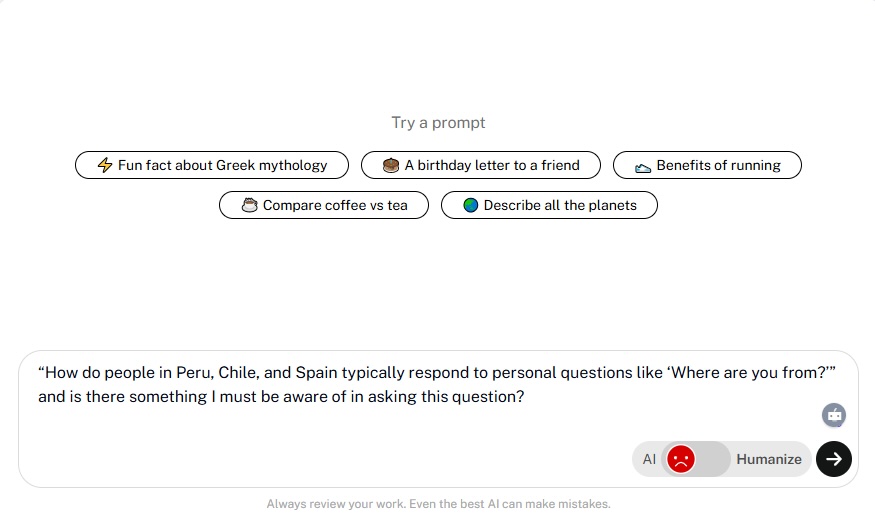
- After inserting the prompt, the AI will give you contextual answers based on the cultural context you’re trying to operate within.
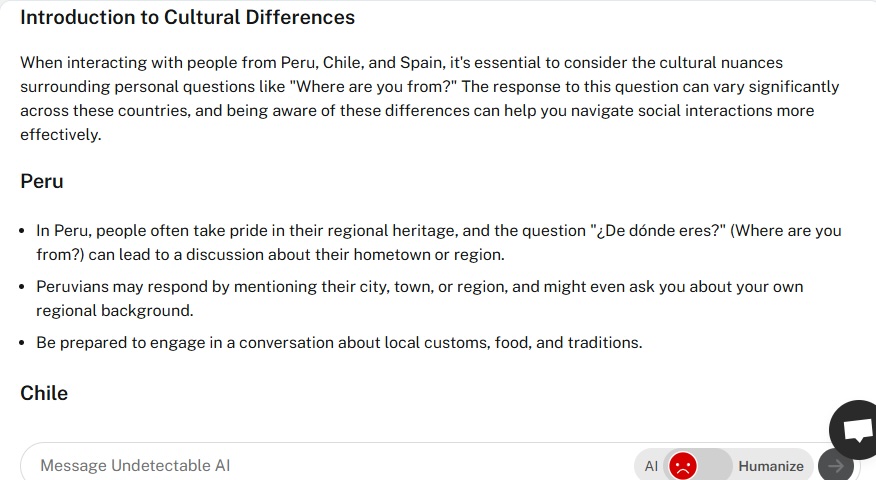
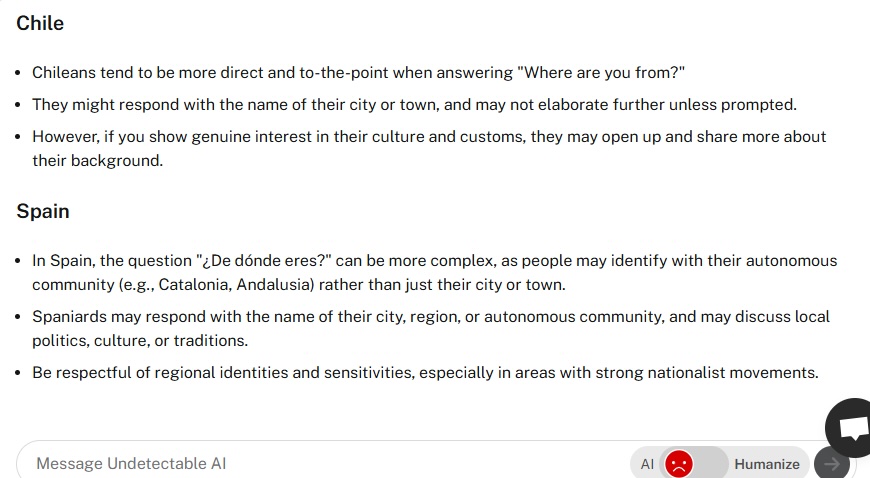
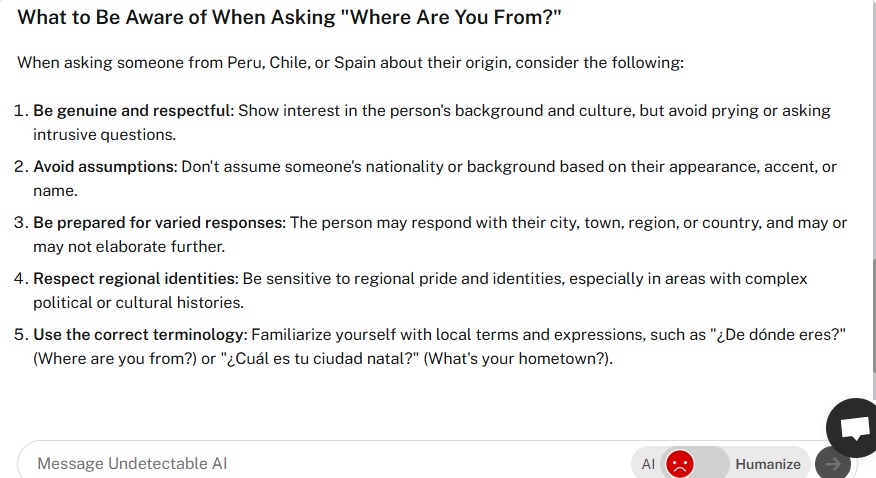
- If you have more questions or wish to elaborate on the context, share this with the AI Chat for more specific and helpful answers.
Regional Variations and Dialects
Now, regional variations and dialects allow a speaker to ask and respond differently to the question “where are you from?”.
Though the question, when asked, appears odd given what you know about “where are you from” in Spanish, you should not be startled when someone probes you with that inquiry.
Above all, being aware of these variations and striving to correctly pronounce names shows respect and cultural sensitivity.
- Spain (Castilian Spanish)
- ¿De dónde eres? (informal)
- ¿De dónde es usted? (formal)
- ¿De qué parte eres? (What part are you from?)
- Mexico and Central America
- ¿De dónde eres?
- ¿De qué parte vienes? (What part do you come from?)
- ¿En dónde naciste? (Where were you born?)
- Caribbean (Cuba, Dominican Republic, Puerto Rico)
- ¿De dónde tú eres? – (Where are you from?)
- ¿De dónde tú eres? – (Where are you from?)
- Andean Region (Colombia, Ecuador, Peru, Bolivia)
- ¿De dónde eres?
- ¿De qué parte vienes? – (Where are you from?)
- Southern Cone (Argentina, Uruguay)
- ¿De dónde sos? (Using “vos” instead of “tú”) – (Where are you from?)
- ¿De qué parte venís? (Using voseo conjugation) – (Where are you from?)
Practice Dialogue Examples
Becoming skilled at asking and answering this generic question goes a long way from just how to say where are you from in Spanish.
You will need practice and gradual improvement before you can be confident enough to hold a dialogue on the given question.
A great way to go about this would be to enable the roleplay mode in our AI Chat and have the AI be your dialogue buddy.
With our AI, you can effectively practice your dialogue and whatever scenario you can think of.
- First of all, ask the AI Chat to adopt the role you are thinking of. It might be of an interviewer, a soon-to-be acquaintance, or a stranger in a marketplace.
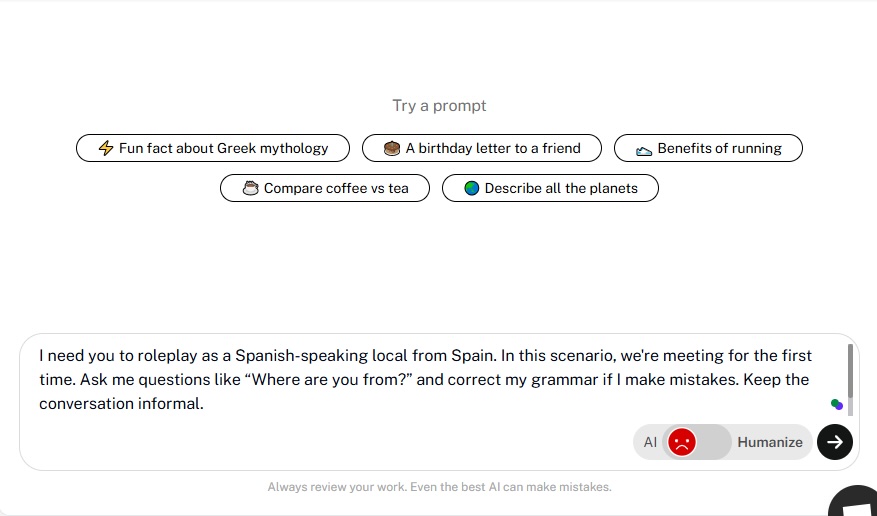
- The AI Chat will assume the role you designate for it. By default, the AI would translate any Spanish expression to English so you can understand and keep up with the conversation. However, if you’d prefer it to be totally in Spanish, you can also request that.
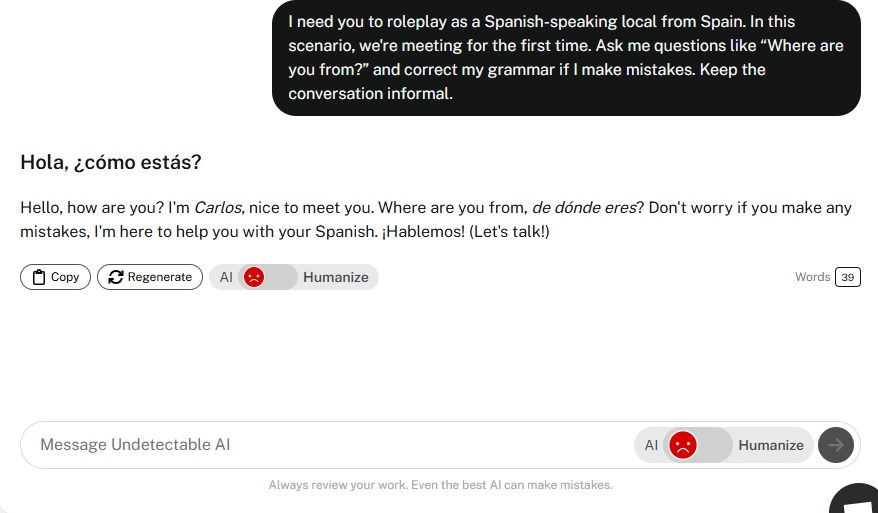
- Now, it’ll be your turn to reply. Don’t be scared to make errors. The AI will correct you when necessary.
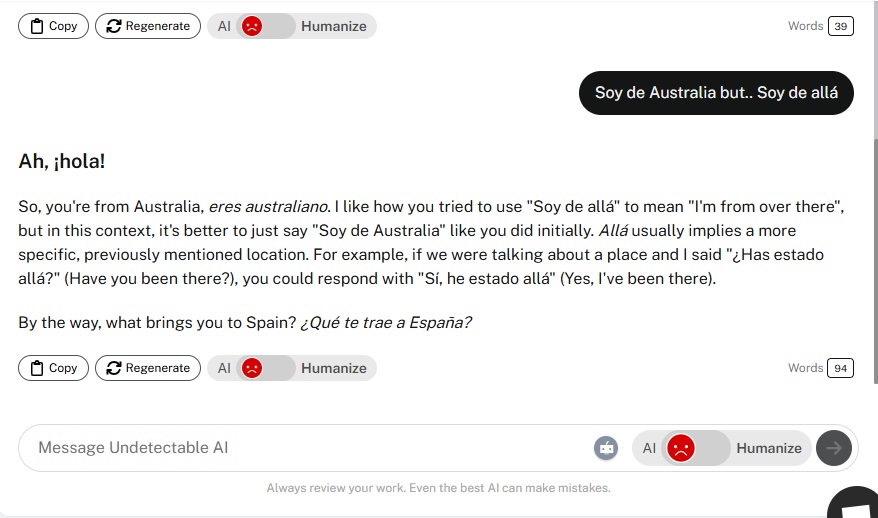
From here, you can continue the chat or change the roleplay to get more accurate answers as needed.
The chat will flow freely with the AI always asking you questions to keep the conversation natural and engaging.
Want to see our AI Detector and Humanizer in action? Check them out in the widget below!
FAQs
Is It Rude To Ask Someone Where They’re From?
On the whole, the answer is no, as asking someone where they are from is not disrespectful. Still, depending on how, why, and where you ask, this will determine it.
Asking this question is considered a polite and natural approach to start a discussion in most Spanish-speaking countries.
It could be considered rude if your tone or follow-up questions sound critical or stereotypical.
If you’re ever not sure, soften the inquiry:
¿De dónde eres, si no te molesta la pregunta?
(Where are you from, if you don’t mind me asking?)
How Do You Say “Where Are You From?” To A Group?
When asking about where a group in Spanish is from, you need to adjust the pronoun “you” to be plural in Spanish.
This is the plural informal version used in Spain only (using vosotros/vosotras):
¿De dónde sois?
(Where are you all from?)
On the other hand, this is the universal plural version used in Latin America (using ustedes):
¿De dónde son? Or ¿De dónde son todos ustedes?
(Where are you all from?)
Conclusion
Since the language is used in both official and informal settings all around, learning how to say where are you from in Spanish has become more important than ever.
Knowing how to say it and answer it will therefore help you to design a smart icebreaker for a conversation and enable you to start one should you find yourself in Spain or Latin America.
Just ensure you’re polite and sensitive to the cultural context when asking this.
Want to practice your Spanish or polish AI-written conversation starters?
Use Undetectable AI to humanize your Spanish writing and make it sound natural and native-level.
